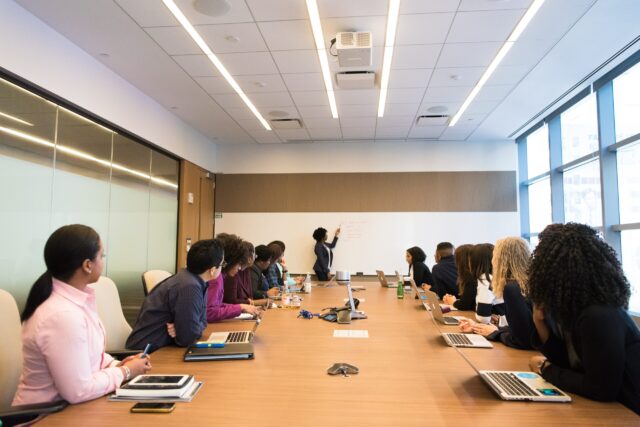There are many different examples of conflicts in the workplace. Conflicts at work can range from minor disagreements to dramatic blow-ups or outright hostility that can threaten company culture. There are times when workplace conflict is constructive and stimulates discussions and innovative ideas.
However, there are also times when conflict continues to intensify and spiral out of control if it isn’t addressed. When workplace conflict isn’t resolved, it can lead to an uncomfortable work environment and may cause staff members to consider changing jobs, undermining the company culture.
To help navigate these challenges, let’s explore common workplace conflicts that arise in the workplace and examine effective strategies for resolving them. This guide aims to equip you with the knowledge to maintain a positive and productive work environment.
Common Workplace Conflict Examples
Workplace conflicts arise for a myriad of reasons. Understanding the nature of these conflicts can help in addressing them effectively. Below, we outline some typical conflict scenarios and provide insights on how to resolve conflict, ensuring a healthier work atmosphere.
1. Work Style Conflicts
Work style conflicts arise when people with different workstyles have to work closely together. Work style conflicts usually involve how tasks are approached or completed. A person who is a go-getter and wants to complete tasks quickly and efficiently may have a hard time collaborating with someone who is laid back and unmotivated to meet deadlines.
Someone who is very organized and likes to plan ahead may have a hard time working with someone who is more impulsive or tackles tasks at the last minute. An individual who likes to focus on projects alone may clash with one who tries to work together for every aspect of a project.
Conflict
You find yourself increasingly at odds with a colleague over how to handle project tasks. You prefer to plan your work in advance, setting clear timelines and objectives, which helps you manage your workload efficiently.
On the other hand, your colleague thrives on last-minute bursts of creativity, often pushing deadlines to their limits, which you find stressful and counterproductive. This clash in working styles has led to a growing tension between you both, impacting the team’s overall morale and productivity.
Resolution
To address the conflict, your manager decides to intervene by facilitating a conflict resolution session where both you and your colleague are encouraged to express your work preferences and concerns. During this session, it becomes clear that a compromise is necessary to harness the strengths of both approaches.
The manager proposes a new workflow where planning phases and creative brainstorming sessions are clearly defined, allowing each of you to work in your preferred style at different stages of the project.
Additionally, regular progress reviews are set up to ensure that both planning and adaptability are balanced, keeping the project on track while fostering a more harmonious working relationship.
2. Misunderstanding or Poor Communication Issues
When people have had life experiences that are much different than those of their coworkers, it’s not uncommon for there to be misunderstandings. Conflicts triggered by generational differences or different cultural expectations can lead to confusion or misinterpreting what someone else says or does.
Conflict
In your diverse workplace, a younger colleague’s casual communication style, involving informal language and digital shorthand in emails, is misunderstood by an older colleague who interprets these communications as unprofessional and dismissive.
The misunderstanding escalates when the older colleague confronts the younger one, leading to a heated exchange where intentions and words are misinterpreted on both sides, creating a tense atmosphere within the team.
Resolution
To resolve the growing tension, your supervisor steps in to mediate a discussion between the two colleagues. The supervisor initiates a communication workshop for the whole team, focusing on understanding different communication styles and cultural expressions.
During the mediation, both parties are encouraged to express their perspectives and feelings about the communication styles. They are guided to establish common ground on acceptable professional communication standards within the workplace.
By facilitating an open dialogue and providing communication training, the supervisor helps both colleagues understand each other’s viewpoints and agree on a more respectful and clear communication approach, thus restoring harmony in the team.
3. Bullying, Discrimination, or Harassment
Bullying, discrimination, and harassment are much more serious examples of conflict situations in the workplace. For instance, sexual harassment or discrimination complaints may center around gender, age, disability, religion, or national origin.
If one staff member accuses another of this type of behavior, their claim needs to be taken seriously and investigated. If an employee approaches you with a complaint, treat them with empathy and respect as you listen to them.
Conflict
A situation arises where an employee, Jane, feels that she has been repeatedly targeted and excluded by a group of her colleagues due to her religious beliefs. The group’s behavior includes making derogatory comments, sexual harassment, and excluding her from team meetings, which Jane perceives as both bullying and religious discrimination. Feeling increasingly isolated and stressed, Jane decides to report the issue to her supervisor.
Resolution
Upon receiving the complaint, the supervisor acts promptly by treating Jane with empathy and respect, ensuring her concerns are heard without judgment. Recognizing the seriousness of the allegations, the supervisor escalates the issue to the HR department. HR conducts a thorough investigation, involving interviews with all parties involved and a review of company communication.
To address the findings and reinforce the company’s stance against such behaviors, HR requires all staff to undergo harassment training. They also implement clear anti-discrimination and sexual harassment policies with specified consequences for violations.
Jane is offered support and counseling to overcome the distress caused by the incidents, and the company commits to ongoing monitoring and culture audits to ensure a safe and respectful working environment for everyone.
4. Power Struggles
Examples of conflict situations in the workplace often involve power struggles. This may be triggered by lack of clarity on who’s responsible for what. If you’re in a leadership role and recognize that staff members have disagreements that seem to be related to roles, you’ll need to get involved and clearly communicate roles and responsibilities.
Conflict
In your department, a recent promotion has intensified underlying tensions. Mike, a long-standing team member, was overlooked for a promotion in favor of Sarah, who is newer but brought significant recent successes to the team.
Mike feels his experience and loyalty to the company have been undervalued, leading to resentment towards Sarah. This resentment manifests in Mike challenging Sarah’s decisions publicly and undermining her authority in front of the team, creating a divisive atmosphere.
Resolution
Recognizing the detrimental impact of this power struggle on team cohesion and productivity, you decide to intervene as their manager. First, you hold individual meetings with Mike and Sarah to understand their perspectives fully and validate their feelings. Next, you organize a team meeting to clarify roles and responsibilities, emphasizing the value of each member’s contributions, regardless of their position.
To address the specific conflict, you propose a mentorship program where Mike can share his extensive knowledge with newer team members, including Sarah, which positions him as a respected senior team member and helps Sarah gain from his experience.
Additionally, you arrange for conflict resolution skills training for the whole team to improve communication and collaboration skills, ensuring everyone is equipped to handle similar issues in the future more constructively.
5. Resistance to Change
Conflicts can arise because some of your team or fellow managers do not want things to change. A good real-life example of workplace conflict concerns relocating to a new office. While the relocation might suit some team members, it elicits complaints from others, such as those about the commute or the size and style of the new “digs.”
Resistance to change can also occur because of unwanted rebranding efforts or new hires that make team members uncomfortable.
Conflict
Your company has decided to relocate the main office to a more modern but distant location as part of a strategic effort to attract better talent and accommodate growth. While the new office boasts advanced facilities like a gym, kitchen, and meditation room, several long-term employees express dissatisfaction.
They are concerned about the longer commute and the unfamiliar new setting, fearing it might disrupt their work-life balance and daily routines.
Resolution
As a manager, you acknowledge the concerns of your team and arrange a series of meetings to address the transition. You start by providing detailed explanations of the reasons behind the move, such as the need for more space and improved amenities, which are intended to enhance their working experience. You also outline the personal and professional benefits that the new office offers.
To involve the team in the transition process, you request their input on how the new space could be organized to better suit their needs and ask for suggestions regarding transportation solutions, like company-provided shuttles or carpool incentives.
By involving employees in decision-making and openly discussing the benefits and challenges, you help ease the transition and reduce resistance, fostering a more accepting and collaborative environment regarding the change.
6. Poor Work Habits
When you get a team of people together, it is unlikely that everyone’s work habits will mesh. Some employees learn and adapt quickly, while others struggle, causing tension. Still others simply have poor work habits that frustrate their ambitious, hardworking team members. They might always be late to work and leave early, have issues meeting deadlines, or spend more time gossiping than they do working.
Conflict
In your team, one member, Alex, consistently arrives late, misses deadlines, and spends a considerable amount of time on personal calls and social media during work hours. This behavior has not only impacted his productivity but also frustrated other team members who are committed and hardworking. The growing resentment is palpable, and team morale has started to decline as other members feel they have to compensate for Alex’s lack of professionalism.
Resolution
As a manager, you first attempt to address the issue by having a private, constructive conversation with Alex to discuss his work habits and the negative impact they are having on the team. You set clear expectations and specific, measurable goals for improvement, along with a timeline for achieving these goals. Despite these efforts, Alex’s performance does not improve.
After a fair trial period, and with continuous feedback, it becomes clear that his current role is not a good fit. You explore the possibility of reassigning Alex to a different role that might better align with his strengths.
However, if no suitable role is available or if his poor habits persist, you make the difficult decision to let him go to preserve the team’s productivity and morale. This decision, while tough, reaffirms the company’s commitment to maintaining a professional and respectful work environment.
7. Competition
While healthy competition in the workplace is usually a good thing because it inspires productivity, too much competition can prove detrimental. Dealing with one or several overly-competitive employees often results in arguments, gossip, and negative feelings.
Conflict
In your sales department, an ongoing contest designed to boost numbers has resulted in increased tension among team members. Two particularly competitive employees, John and Lisa, have been at odds, each accusing the other of unfair tactics to win. Their rivalry has escalated to the point where it’s affecting the atmosphere of the entire team, leading to divisions and reduced cooperation.
Resolution
Observing the negative impact of the heightened competition, you decide to intervene by temporarily halting the contest. As a conflict management strategy, you hold a team meeting to address the issues openly, discussing how the competition has evolved and its effects on team dynamics.
During this pause, you focus on team-building activities that emphasize collaboration over competition, such as group problem-solving challenges that require cooperation to succeed. When you reintroduce contests, you shift the focus to lighter, more inclusive competitions that encourage humor and creativity, like goofy photo captions or costume contests.
This approach helps to diffuse the tension, refocusing the team on enjoying their work and each other’s company rather than solely on outperforming one another.
8. Personality Clashes
Having several distinct personalities in one workplace setting can easily result in conflicts. Some workers might feel that their fellow employees are abrasive, tactless, and offensive or use words such as “mousey,” “wimpy,” or “annoyingly quiet” to characterize team members during off-hours. Perhaps some employees do not enjoy their coworkers discussing politics during lunch or how loud they are.
Conflict
Within your project team, tensions have risen between two members, Tom and Sarah. Tom is outspoken and tends to dominate discussions, which Sarah, who is more reserved and prefers written communication, finds overbearing and rude.
Their differing personality styles have led to misunderstandings and resentment, with Sarah feeling undervalued and Tom feeling frustrated by what he perceives as Sarah’s lack of engagement.
Resolution
To employ conflict management in this scenario, you arrange a mediation session where both Tom and Sarah can express their feelings and perspectives in a controlled, respectful setting. During the session, you emphasize the importance of professional decorum and the need to respect diverse personality types and communication styles.
You introduce guidelines for team interactions, such as structured meeting formats that allow equal time for each member to speak, and the use of a shared digital platform for project updates, which caters to both verbal and written communication preferences.
Resolving workplace conflict effectively is essential for maintaining a harmonious environment. Each type of conflict, whether it involves misunderstandings, power struggles, or personality clashes, requires a unique conflict resolution strategy that fosters communication and empathy.

9. Employee Not Meeting Expectations
One of the most common forms of conflict in the workplace occurs when an employee consistently underperforms. The underlying issue is not always laziness or apathy. In many cases, the problem can be traced back to unclear expectations that were never clarified at the start. When no one addresses it directly, tension builds, assumptions form, and collaboration suffers.
Conflict Scenario
Carlos, a team member in the operations department, has been turning in incomplete reports and missing key deadlines. His coworkers are frustrated, quietly stepping in to fix his mistakes while resenting the extra work. Meanwhile, Carlos senses their frustration but feels unsure of what he is doing wrong. The disconnect deepens with each passing week.
Resolution
Rather than allowing the situation to fester, the manager schedules one-on-one meetings to hear each side. In his conversation with Carlos, something important surfaces: Carlos did not fully understand recent changes in project priorities. He also feels unequipped to use the new reporting tools introduced last month.
Together, they review expectations, set measurable goals, and agree on weekly check-ins. On the other hand, this is not just about performance. It is about restoring mutual understanding, building confidence, and improving job satisfaction across the team.
10. Experiencing Creative Differences
Creative tension can be a healthy part of collaboration. However, when it tips into frustration or ego, it becomes a real conflict in the workplace.
Differing visions, clashing styles, or inadequate communication often fuel these disagreements. When creative teams lack clear expectations, the result is confusion.
Conflict Scenario
A product design team is stuck. Mia wants to push the boundaries with a bold new concept, while Jordan insists on a safer, data-driven approach. Each employee believes their idea is best for the company.
Brainstorming sessions turn into battles, and eye rolls replace feedback. The rest of the team grows tense, unsure of whose lead to follow.
Resolution
Rather than let the project stall, the team leader brings everyone together for a facilitated group session focused on active listening. Each person shares their ideas without interruption. Colleagues begin to hear the reasoning behind one another’s perspectives. By the end of the discussion, the group reaches a middle ground that blends innovation with practicality.
On the other hand, what really changes is the dynamic. This process strengthens the team’s creative collaboration and highlights the value of empathy. It also opens the door for future professional development opportunities rooted in communication, not just technical skills.
11. Interpersonal Conflicts
Personality differences are inevitable in any workplace. When those differences are left unchecked, they often evolve into something more disruptive.
What begins as tension can quietly unravel collaboration, especially when poor communication replaces honest conversation. This type of conflict often lingers in the background, slowly creating divisions that are difficult to reverse.
Conflict Scenario
Simone and Derek are both strong performers, but they cannot seem to get along. Derek sees Simone as aggressive and controlling. Simone sees Derek as passive-aggressive and unresponsive.
The two rarely speak directly. Meetings are awkward, decisions stall, and the rest of the team starts choosing sides. No one knows how the conflict began, but everyone feels its impact.
Resolution
Their manager recognizes the pattern and calls in a professional mediator. During the session, each employee is given the space to speak without being interrupted.
Slowly, assumptions begin to break down. Derek learns that Simone’s urgency stems from high expectations, not hostility. Simone realizes that Derek values structure, not power. The tone shifts, and respect begins to take root.
What this means is that the team moves forward, not by forcing friendship but by restoring clarity and trust. Over time, the company begins to integrate conflict resolution training into its leadership development.
12. Differences in Values
Conflicts rooted in values are more complex than everyday disagreements. They are tied to identity, experience, and belief systems. This makes them harder to spot and even harder to resolve. When poor communication combines with unspoken judgment or discomfort, these issues can quietly divide a team.
Conflict Scenario
A new policy allows flexible working hours to support work-life balance. While many employees appreciate the change, one team member objects, claiming others are abusing the system. Tension grows when that same employee is overheard making remarks about a colleague’s sexual orientation.
Another employee, coming from a more traditional background, voices discomfort over Pride Month displays. These small moments build up. No one says anything directly, but trust erodes. A few begin to suspect that discriminatory behavior is being normalized.
Resolution
The department leader decides to hold a group listening session. With a neutral facilitator guiding the conversation, employees are encouraged to speak openly but also to listen fully.
As people share their stories and cultural differences, something shifts. People begin to see what they had missed before. Some become more self-aware. Others ask honest questions.
On the other hand, the real win is not just resolution but understanding. Differences remain, but the team now has the tools to move forward with respect, not silence.
Ready to Transform Your Workplace? Discover Our Conflict Resolution Solutions Today!
Explore our conflict resolution services for personalized guidance on how to resolve conflicts. If you’re facing persistent workplace challenges, don’t hesitate to Contact Us for expert support. By resolving workplace conflicts constructively, you can transform challenges into opportunities for growth and enhance your team’s productivity.








